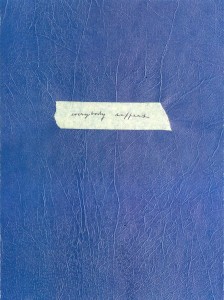52 pages, $12
Review by Matt Pincus
Juan Garcia Madero, the supposed writer of the poems in Everybody Suffers is the protagonist of Roberto Bolaño’s The Savage Detectives. He is an observer and student of the leaders of the visceral realist poetry movement, Ulises Lima and Arturo Belano. One knows Madero writes poems, which are never seen in Bolano’s text, thus giving Longabucco the impetus to posit himself as a fictional scholar and translator.
Everybody Suffers carries elements of imagist poetry from H.D. and Pound that mince with transgression, political rebellion, and hint at an echo, or reverie from French Symbolists haunting the text. Also, Longabucco’s speakers use Bolano’s fictional elements and themes in poems such as “Age of Enlightenment,” which draws directly from the corrupt policemen in 2666 who are complicit in the murders of young women around the town of Santa Teresa. Longabucco, as a fictional translator of a fictional character’s poetry, shows the government’s complicity in corrupt drug cartels, something more present now than ever after 43 students went missing in Iguala, Mexico two months ago:
and then destroyed the hands with acid
and then tore up the autopsy report
and then cremated the body and the prints
and threw all the ashes in the ashcan
and then buried the ashcan in a desert
not on earth.
In the Petrarchan free verse, “Sonnet by the Side of the Road,” the ending tercets contrast from a stanza of philosophical beauty reminiscent of Keats back to a violent imagist reflection of whom the speaker loves:
I’ll live forever for having dared
to promise to make you live forever
in lines that sing your beautyThe cars’ high-beams all stared
while the gas pump hung from your slender arm
like a savage creature’s claw dripping blood.
The volta falls on industrial markers of the urban sprawl back to a primal, or primordial state of being – the opposite of civilization rooted in romantic attraction. However, the first part of the poem is a narcissistic meditation on how the speaker will live on after he or she dies. Ironically, the lyric is shattered into scattered elements or fractures of how thoughts exist in reality.
The poem “Guernica” also exemplifies what Belano in The Savage Detectives would term “visceral realism,” and what Bolaño would term Infrarealist, a poetry movement he participated in during the late ‘70s in Mexico City. A metaphor of “a kid with a fever” swirls into the philosophical with “a dream of conquest,” which is to be seen by the speaker “not to crush,” but rather, “mingle without dissolving.” Arturo Belano and Ulises Lima essentially commit to this philosophical framework as is told through journal entries and others connected with their international wanderings in the second part of The Savage Detectives. The pairing of words succeeding the philosophical claim such as, “the lush waltz, the raked embers, / the blue curse, the vaporous muscle, / the vaunted tattoo, the singed grass,” all deceptively look like oxymorons but in fact are pairing of adjectives to nouns, which force us to make an image uncommon with its subject.
Longabucco is a talented poet, but he occasionally falters in pieces such as “College Admissions,” a transgressive farce of a college admissions office, a joke reserved for the author himself rather than his readers. His best poems are longer, meditative such as “Hold the Line” and “Dawn of the Alchemist.” They carry through extended metaphors, play off repetition, consider imaginative language and subtle binaries, allowing imaginative space for the reader’s mind to not only consider Longabucco’s work, but also that of a fictional master: Roberto Bolaño.
***
Matt Pincus was born and raised in San Diego, CA. He earned a B.A. in English from Pitzer College and is currently an M.F.A. candidate at the Jack Kerouac School in Boulder, CO. His reviews have appeared in Bookslut, Raintaxi,Necessary Fiction, and recently published an essay on Dodie Bellamy in Coldfront.
![[PANK]](http://pankmagazine.com/wp-content/themes/pank/assets/images/pank-logo-large.png)

